Strategy for Developing Lake Toba Tourism Potential
Abstract
Abstract
Lake Toba has great potential as a national leading tourist destination with extraordinary natural and cultural wealth. However, tourism development in the region still faces various challenges, such as limited infrastructure, lack of empowerment of local communities, and low utilization of digital technology in promotion. This study aims to evaluate the strategy for developing the tourism potential of Lake Toba with a focus on improving the quality of local stakeholders. The approach used was qualitative with a case study method, involving in-depth interviews, participatory observations, and documentation studies of 25 participants. The results of the study show that collaboration between the government, local communities, and the private sector is the key to sustainable tourism development. Infrastructure needs to be improved, cultural preservation must be strengthened, and destination promotion must rely more on digital media. In addition, human resource training and environmental management are important aspects to realize an inclusive and sustainable tourism ecosystem. This study recommends a holistic approach based on cross-sector collaboration to optimize the tourism potential of Lake Toba.
Abstrak
Danau Toba memiliki potensi besar sebagai destinasi wisata unggulan nasional dengan kekayaan alam dan budaya yang luar biasa. Namun, pengembangan pariwisata di kawasan masih menghadapi berbagai tantangan, seperti infrastruktur yang terbatas, kurangnya pemberdayaan masyarakat lokal, dan rendahnya pemanfaatan teknologi digital dalam promosi. Penelitian ini bertujuan untuk mengevaluasi strategi pengembangan potensi pariwisata Danau Toba dengan fokus pada peningkatan kualitas pemangku kepentingan lokal. Pendekatan yang digunakan bersifat kualitatif dengan metode studi kasus, melibatkan wawancara mendalam, observasi partisipatif, dan studi dokumentasi terhadap 25 peserta. Hasil penelitian menunjukkan bahwa kolaborasi antara pemerintah, masyarakat lokal, dan sektor swasta merupakan kunci pengembangan pariwisata berkelanjutan. Infrastruktur perlu ditingkatkan, pelestarian budaya harus diperkuat, dan promosi destinasi harus lebih mengandalkan media digital. Selain itu, pelatihan sumber daya manusia dan pengelolaan lingkungan menjadi aspek penting untuk mewujudkan ekosistem pariwisata yang inklusif dan berkelanjutan. Penelitian ini merekomendasikan pendekatan holistik berbasis kolaborasi lintas sektor untuk mengoptimalkan potensi pariwisata Danau Toba.
Keywords
Full Text:
PDFReferences
Ahmed, A., Kimbu, A. N., & McIntosh, A. J. (2022). Community-based tourism and cultural sustainability. Journal of Sustainable Tourism, 30(1), 92–111.
Akbarudin, S.A., & Pratama, Y.A. (2024). Increasing the synergy of village governments through the pentahelix model in tourism development. Journal of Tourism Governance, 5(1), 55–68
Becken, S., & Job, H. (2022). Designing outdoor tourism activities for ecological sustainability: Challenges and strategies. Journal of Sustainable Tourism, 30(4), 672–688.
Braun, V., & Clarke, V. (2021). One size fits all? What counts as quality practice in (reflexive) thematic analysis?. Qualitative research in psychology, 18(3), 328-352.
Daryana, A.P., & Damanik, P.A. (2025). The method of managing the Pariban Hot Springs tourist attraction in improving the economy of the people of the village of Semangat Gunung Brastagi. Central Publishers, 3(3), 252–267.
Fairuzia, F., Hasanah, S. N., & Rachmawati, R. (2024). Diversify MSME income in hot spring tourism areas. Journal of Local Economic Development, 6(1), 34–47.
Font, X., & McCabe, S. (2022). Sustainability and marketing in tourism: Balancing growth with conservation. Journal of Sustainable Tourism, 30(7), 1261–1278.
Giampiccoli, A., & Mtapuri, O. (2020). Towards a theoretical framework for community-based tourism in developing countries. Current Issues in Tourism, 23(4), 485–500.
Hernández-Mogollón, J. M., Duarte, P. A., & Folgado-Fernández, J. A. (2020). Cultural tourism and heritage authenticity: The impact of tourists’ perceptions on destination image and behavioral intentions. Journal of Sustainable Tourism, 28(6), 888–911.
Lee, S. H., & Xie, K. L. (2022). Digital marketing strategies in tourism: A post-pandemic perspective. Tourism Management Perspective, 41, 100905.
Normelani, E., Riadi, S., & Efendi, M. (2022). Analysis of community-based ecotourism management in the Meratus Mountains area, South Kalimantan. Journal of Regional & Urban Development, 18(2), 121–132.
Novelli, M., & Benson, A. M. (2020). Sustainable tourism and inclusive development: An agenda for action. Journal of Sustainable Tourism, 28(10), 1530–1548.
Pratiwi, P. D., Santosa, H., & Wibowo, A. (2021). The concept of green infrastructure in the development of super priority destinations. Indonesian Journal of Tourism Development, 9(1), 23–34.
Puspitasari, Y., & Muhamad, M. (2023). Analisis kebutuhan pelatihan berdasarkan kompetensi pramuwisata di Provinsi Jawa Tengah (Competency-based training needs analysis of tour guide in Central Java). Journal of Indonesian Tourism, Hospitality and Recreation, 6(1), 105-120.
Ruhanen, L., Moyle, B. D., & Moyle, C. (2022). Collaborative approaches to sustainable tourism development: Strengthening community, government and private sector partnerships. Journal of Sustainable Tourism, 30(5), 1023–1041.
Stone, L. S., & Nyaupane, G. P. (2020). Local residents’ pride, tourists’ playground: The misrepresentation and exclusion of local residents in tourism. Current Issues in Tourism, 23(11), 1426-1442.
Wicaksana, MGB (2024). Mapping of tourist attractions in Magelang Regency based on WebGIS Storymaps to improve the digital promotion of tourist villages. Warehouse of Multidisciplinary Journals, 8(2), 91–105.
Zahra, A.H., & Samadi, R.K. (2024). Analysis of the socio-economic potential of Parangtritis Village in supporting the development of sustainable tourism villages. Indonesian Journal of Sustainable Tourism, 6(1), 45–57.
DOI: https://doi.org/10.17509/jithor.v8i1.79612
Refbacks
- There are currently no refbacks.

This work is licensed under a Creative Commons Attribution-ShareAlike 4.0 International License.
eISSN : 2654-4687
pISSN : 2654-3893
This work is licensed under Creative Commons Attribution-ShareAlike 4.0 International License















